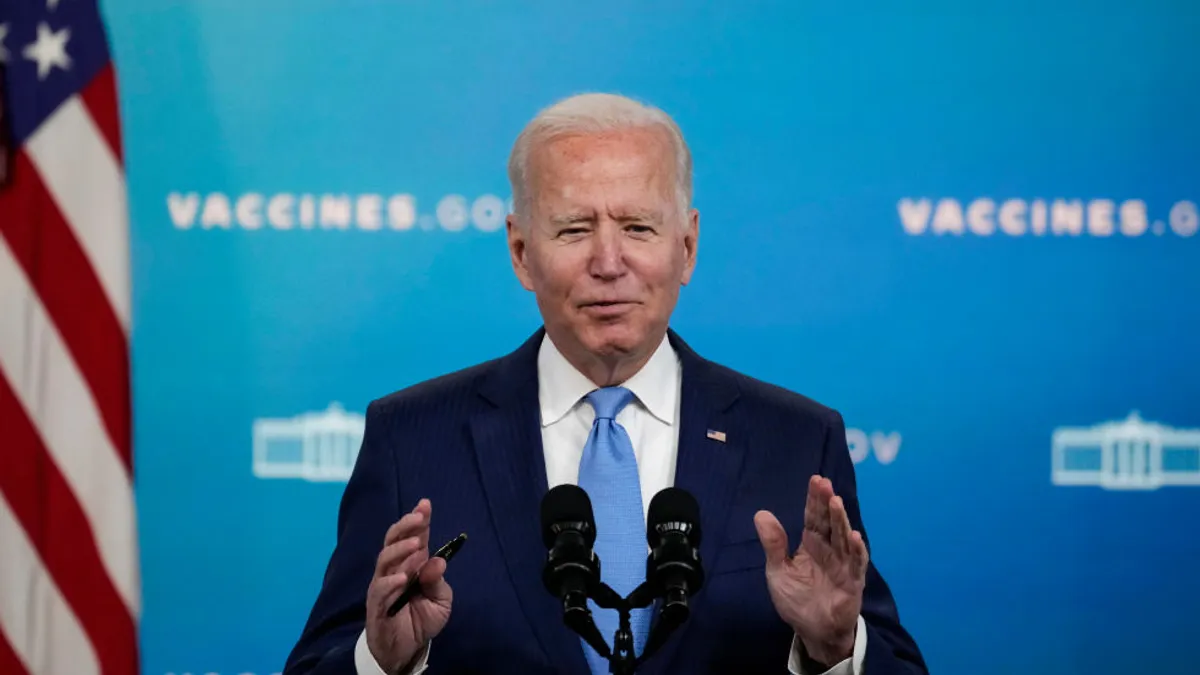Dive Brief:
- The Biden administration on Thursday announced an action plan to combat the surge in new U.S. coronavirus cases, including requiring employers with more than 100 employees to mandate vaccines or require weekly testing for their workers.
- President Joe Biden in remarks said the emergency rule from the Department of Labor will impact more than 80 million employees to ensure workforces are fully vaccinated or show a negative test at least once a week. AdvaMed and the American Clinical Laboratory Association in separate statements applauded Biden's focus on testing.
- Abbott Laboratories, Becton Dickinson, Qiagen, Quest Diagnostics and Quidel are among the companies analysts believe will benefit. Using the Defense Production Act, the White House will push for expanded test production, with $2 billion earmarked for the federal government to purchase nearly 300 million rapid antigen tests for U.S. schools, health centers and food banks.
Dive Insight:
The initiative comes as the diagnostics industry has scrambled to add manufacturing capacity as the surge in delta variant cases has increased demand for PCR and at-home rapid antigen tests.
"We see this announcement as another proof point that testing is not going away or falling off rapidly any time soon," William Blair analysts wrote in a Friday note. However, even with DPA invocation they predicted "it will likely be months before meaningful additional supply comes on the market to be able to address the current demand, and at that time it is unclear what the demand will look like."
Quest on Thursday, prior to the White House announcement, updated its 2021 outlook due to stronger than anticipated COVID-19 molecular testing volume. Revenue for 2021 is now expected in a range of $9.84 billion to $10.09 billion up from a prior view of $9.54 billion to $9.79 billion.
The lab giant said it expects the delta-driven surge will remain stronger than previously anticipated, with Quest's low-end outlook now assuming average volumes of at least 40,000 molecular tests daily for the second half of the year versus previous guidance of 20,000.
William Blair analysts noted the 40,000 molecular tests per day figure is the low end of Quest's guidance and they "expect that floor to prove quite conservative with additional opportunities for upside from return-to-office and back-to-school testing regimes."
William Blair analysts contend the most obvious beneficiaries of the initiative are Abbott, Becton Dickinson, Qiagen and Quidel, all of whom make rapid tests.
"There is simply nowhere near enough supply of POC or OTC tests (PCR tests could be used for regular screening but come with logistical and cost hurdles) today to meet the demand of the U.S. government (280 million tests), employers (likely millions of tests per week), schools, traditional healthcare settings, and retail demand," they wrote.
Still, William Blair analysts believe molecular testing companies such as Hologic "could also see a benefit from school programs and other types of non-POC or OTC settings (mandated employer testing)."
Benefiting Quidel, according to Craig-Hallum analysts, is rival Abbott's workforce reduction this summer.
Qiagen in July joined Abbott and Quidel in cutting 2021 outlook as coronavirus testing demand waned. However, BD and Quidel have respectively said there was "increased" and a "surge" in demand in August.
Quidel last week reported strong demand for both its Sofia and QuickVue COVID-19 rapid antigen tests, as the company makes its at-home OTC QuickVue diagnostic available at more than 7,000 CVS locations in the U.S. and online.
"On the negatives, QDEL is now selling a higher mix of COVID tests through QuickVue at-home, which carries a lower gross margin than Sofia or PCR. We are also seeing out-of-stock notifications for QuickVue at-home at Amazon, while some Walgreens stores are out of physical inventory (despite being on the website)," Craig-Hallum analysts said.
Amazon, Kroger and Walmart will offer at-home rapid COVID-19 tests in stores and online at up to a 35% discount beginning this week as part of the Biden plan. The nation's largest retailers will sell the tests at-cost for the next three months.
William Blair analysts noted that CVS and Walgreens were not mentioned in the administration's announcement, despite the fact that they are where the majority of OTC tests are sold. "It is unclear if that means CVS and Walgreens will operate under different pricing than these other locations," the analysts said.














